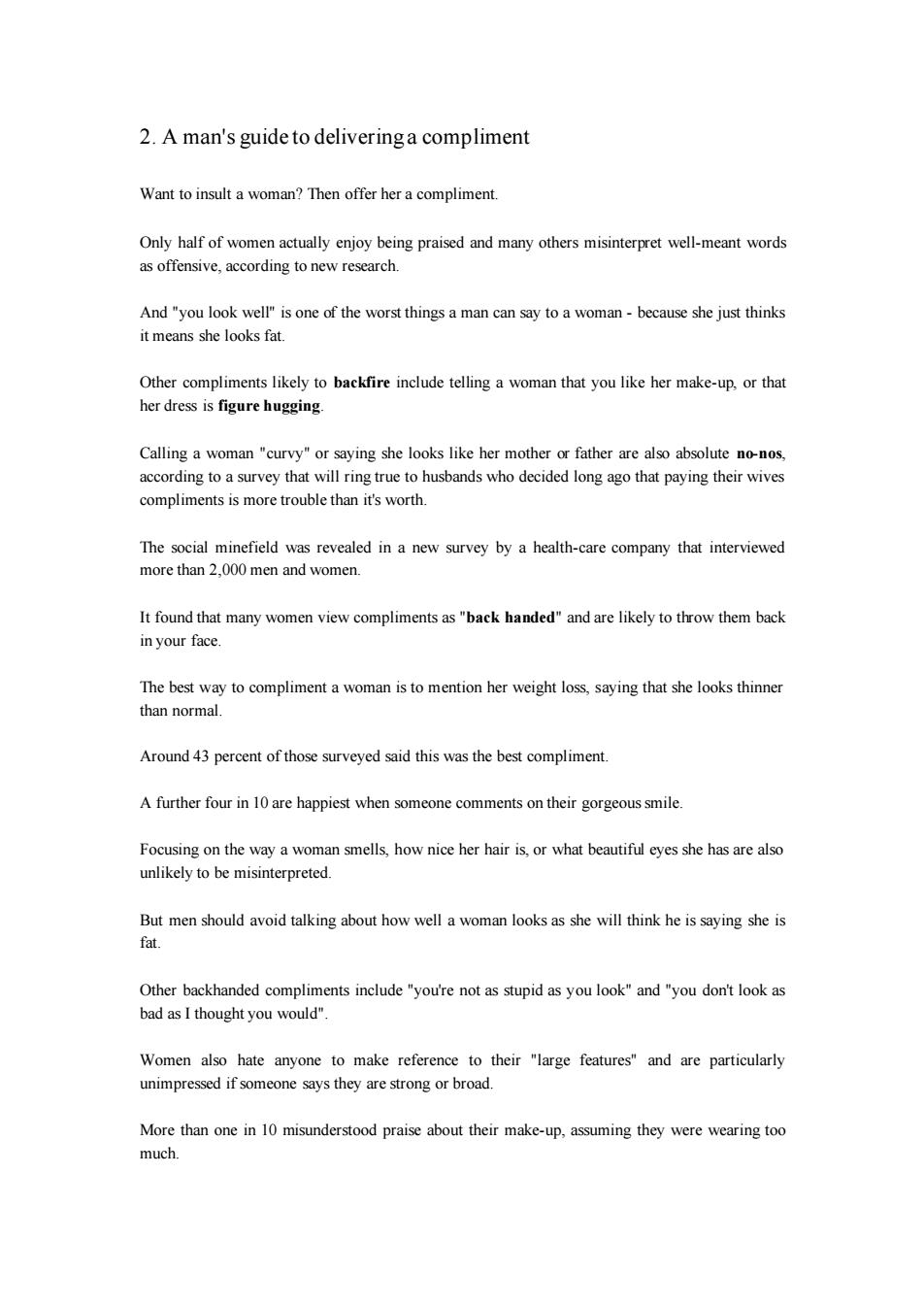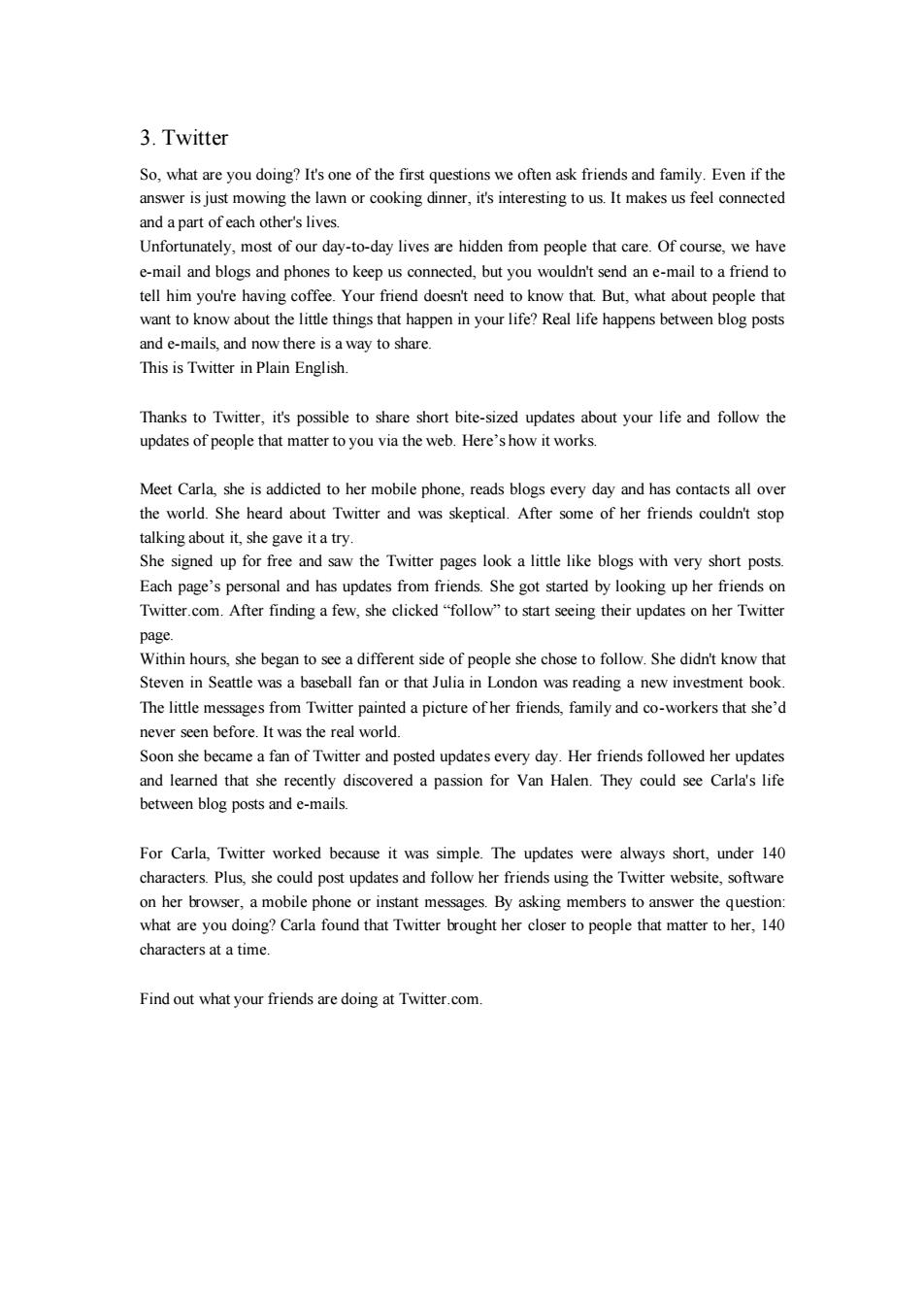
1.Communication Problems Ethel:Can we talk? Fred:Uh-huh Ethel:I don't think we communicate very well.We don't talk to each other like we used to.I think we need to have a dialogue about these dysfunctional communication patterns. Fred:Hmm. Ethel:I think we need to work on our relationship.We have a strong foundation,but we have problems relating to each other.Oprah says... Fred:Hold on!Is this something you saw on the Oprah show? Ethel:Well,yes,it is.Oprah did a show about how couples grow apart after years of being together,and good communication is the cornerstone of a good relationship.Being a sympathetic listener and validating each other's feelings are very important. Fred:Stop right there.I'll make you a deal.I'll communicate more with you.but you have to promise not to bring up Oprah again.I don't want a talk show host telling me how to run my life. Ethel:She's more than a talk show host.She's... Fred:I mean it.I'm putting my foot down.No more Oprah.Okay? Ethel:Okay,if that's how you feel about it. Fred:It is. Ethel:That's fine,but I wonder what Dr.Phil would say about your hostile feelings toward Oprah Fred:Uh!
1. Communication Problems Ethel: Can we talk? Fred: Uh-huh. Ethel: I don’t think we communicate very well. We don’t talk to each other like we used to. I think we need to have a dialogue about these dysfunctional communication patterns. Fred: Hmm. Ethel: I think we need to work on our relationship. We have a strong foundation, but we have problems relating to each other. Oprah says... Fred: Hold on! Is this something you saw on the Oprah show? Ethel: Well, yes, it is. Oprah did a show about how couples grow apart after years of being together, and good communication is the cornerstone of a good relationship. Being a sympathetic listener and validating each other’s feelings are very important. Fred: Stop right there. I’ll make you a deal. I’ll communicate more with you, but you have to promise not to bring up Oprah again. I don’t want a talk show host telling me how to run my life. Ethel: She’s more than a talk show host. She’s... Fred: I mean it. I’m putting my foot down. No more Oprah. Okay? Ethel: Okay, if that’s how you feel about it. Fred: It is. Ethel: That’s fine, but I wonder what Dr. Phil would say about your hostile feelings toward Oprah. Fred: Uh!

2.A man's guide to delivering a compliment Want to insult a woman?Then offer her a compliment. Only half of women actually enjoy being praised and many others misinterpret well-meant words as offensive,according to new research. And "you look well"is one of the worst things a man can say to a woman-because she just thinks it means she looks fat Other compliments likely to backfire include telling a woman that you like her make-up,or that her dress is figure hugging. Calling a woman "curvy"or saying she looks like her mother or father are also absolute no-nos, according to a survey that will ring true to husbands who decided long ago that paying their wives compliments is more trouble than it's worth. The social minefield was revealed in a new survey by a health-care company that interviewed more than 2,000 men and women. It found that many women view compliments as"back handed"and are likely to throw them back in your face. The best way to compliment a woman is to mention her weight loss,saying that she looks thinner than normal. Around 43 percent of those surveyed said this was the best compliment. A further four in 10 are happiest when someone comments on their gorgeous smile. Focusing on the way a woman smells,how nice her hair is,or what beautiful eyes she has are also unlikely to be misinterpreted. But men should avoid talking about how well a woman looks as she will think he is saying she is fat. Other backhanded compliments include "you're not as stupid as you look"and "you don't look as bad as I thought you would". Women also hate anyone to make reference to their "large features"and are particularly unimpressed if someone says they are strong or broad. More than one in 10 misunderstood praise about their make-up,assuming they were wearing too much
2. A man's guide to delivering a compliment Want to insult a woman? Then offer her a compliment. Only half of women actually enjoy being praised and many others misinterpret well-meant words as offensive, according to new research. And "you look well" is one of the worst things a man can say to a woman - because she just thinks it means she looks fat. Other compliments likely to backfire include telling a woman that you like her make-up, or that her dress is figure hugging. Calling a woman "curvy" or saying she looks like her mother or father are also absolute no-nos, according to a survey that will ring true to husbands who decided long ago that paying their wives compliments is more trouble than it's worth. The social minefield was revealed in a new survey by a health-care company that interviewed more than 2,000 men and women. It found that many women view compliments as "back handed" and are likely to throw them back in your face. The best way to compliment a woman is to mention her weight loss, saying that she looks thinner than normal. Around 43 percent of those surveyed said this was the best compliment. A further four in 10 are happiest when someone comments on their gorgeous smile. Focusing on the way a woman smells, how nice her hair is, or what beautiful eyes she has are also unlikely to be misinterpreted. But men should avoid talking about how well a woman looks as she will think he is saying she is fat. Other backhanded compliments include "you're not as stupid as you look" and "you don't look as bad as I thought you would". Women also hate anyone to make reference to their "large features" and are particularly unimpressed if someone says they are strong or broad. More than one in 10 misunderstood praise about their make-up, assuming they were wearing too much

3.Twitter So,what are you doing?It's one of the first questions we often ask friends and family.Even if the answer is just mowing the lawn or cooking dinner,it's interesting to us.It makes us feel connected and a part of each other's lives. Unfortunately,most of our day-to-day lives are hidden from people that care.Of course,we have e-mail and blogs and phones to keep us connected,but you wouldn't send an e-mail to a friend to tell him you're having coffee.Your friend doesn't need to know that.But,what about people that want to know about the little things that happen in your life?Real life happens between blog posts and e-mails,and now there is a way to share. This is Twitter in Plain English. Thanks to Twitter,it's possible to share short bite-sized updates about your life and follow the updates of people that matter to you via the web.Here's how it works. Meet Carla,she is addicted to her mobile phone,reads blogs every day and has contacts all over the world.She heard about Twitter and was skeptical.After some of her friends couldn't stop talking about it,she gave it a try. She signed up for free and saw the Twitter pages look a little like blogs with very short posts. Each page's personal and has updates from friends.She got started by looking up her friends on Twitter.com.After finding a few,she clicked "follow"to start seeing their updates on her Twitter page. Within hours,she began to see a different side of people she chose to follow.She didn't know that Steven in Seattle was a baseball fan or that Julia in London was reading a new investment book. The little messages from Twitter painted a picture of her friends,family and co-workers that she'd never seen before.It was the real world. Soon she became a fan of Twitter and posted updates every day.Her friends followed her updates and learned that she recently discovered a passion for Van Halen.They could see Carla's life between blog posts and e-mails. For Carla,Twitter worked because it was simple.The updates were always short,under 140 characters.Plus,she could post updates and follow her friends using the Twitter website,software on her browser,a mobile phone or instant messages.By asking members to answer the question: what are you doing?Carla found that Twitter brought her closer to people that matter to her,140 characters at a time Find out what your friends are doing at Twitter.com
3. Twitter So, what are you doing? It's one of the first questions we often ask friends and family. Even if the answer is just mowing the lawn or cooking dinner, it's interesting to us. It makes us feel connected and a part of each other's lives. Unfortunately, most of our day-to-day lives are hidden from people that care. Of course, we have e-mail and blogs and phones to keep us connected, but you wouldn't send an e-mail to a friend to tell him you're having coffee. Your friend doesn't need to know that. But, what about people that want to know about the little things that happen in your life? Real life happens between blog posts and e-mails, and now there is a way to share. This is Twitter in Plain English. Thanks to Twitter, it's possible to share short bite-sized updates about your life and follow the updates of people that matter to you via the web. Here’s how it works. Meet Carla, she is addicted to her mobile phone, reads blogs every day and has contacts all over the world. She heard about Twitter and was skeptical. After some of her friends couldn't stop talking about it, she gave it a try. She signed up for free and saw the Twitter pages look a little like blogs with very short posts. Each page’s personal and has updates from friends. She got started by looking up her friends on Twitter.com. After finding a few, she clicked “follow” to start seeing their updates on her Twitter page. Within hours, she began to see a different side of people she chose to follow. She didn't know that Steven in Seattle was a baseball fan or that Julia in London was reading a new investment book. The little messages from Twitter painted a picture of her friends, family and co-workers that she’d never seen before. It was the real world. Soon she became a fan of Twitter and posted updates every day. Her friends followed her updates and learned that she recently discovered a passion for Van Halen. They could see Carla's life between blog posts and e-mails. For Carla, Twitter worked because it was simple. The updates were always short, under 140 characters. Plus, she could post updates and follow her friends using the Twitter website, software on her browser, a mobile phone or instant messages. By asking members to answer the question: what are you doing? Carla found that Twitter brought her closer to people that matter to her, 140 characters at a time. Find out what your friends are doing at Twitter.com